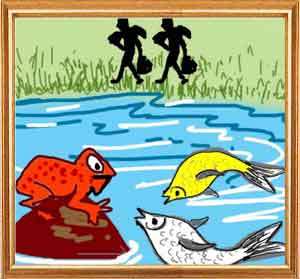Two fish named Sahasrabuddhi and Satabuddhi made a lake their home. They had a frog as a friend whose name was Ekabuddhi. Every day, they used to meet on the bank of the lake and discuss everything under the sun and disperse at sunset. One day, they saw some fishermen equipped with nets and each carrying a basket full of fish came that way and saw the lake and noticed that it was full of good fish. They told themselves that they should come early the next morning and bait the fish.
The fish heard their conversation and were very worried. Then the frog asked Satabuddhi for advice.

“O Satabuddhi, you have heard what the fishermen were planning. Now tell us what we should do. Should we remain in the lake or go somewhere else.”
Sahsrabuddhi answered the question, “Don’t worry. You should not be scared by just words. The learned have said “The world is still safe because the dreams of snakes and wicked men never come true.” The fishermen may not even come tomorrow. If they come, I am here to save you.”
Satabuddhi said, “You are a genius. What you say is correct. There is nothing that accomplished men cannot conquer. Remember how Chanakya had killed all the armed Nandas.
“Where one cannot pierce sun and wind
The wits of a resourceful man enter.
One should not leave motherland, for,
Nothing is happier than one’s own land.”
Then, Ekabuddhi, the frog, said, “Friends, flight is the only thing I know. So, I and my wife will leave this place tonight itself.”
Accordingly, the frog left the lake immediately. Next day, the fishermen came and netted lot of fish, frogs, crabs, turtles etc. and also Satabuddhi and Sahasrabuddhi and killed all of them. One of them carried Satabuddhi on his head because he was heavier and slung Sahsrabuddhi to his arm because he was long.
Ekabuddhi showed this scene to his wife and said, “Didn’t I tell you what the fishermen will do? Now, see the plight of Satabuddhi and Sahasrabuddhi.”
At the end, Chakradhara said, “O Suvarnasiddhi, you said that wisdom is superior to knowledge. But I say that wisdom alone without education does not serve any purpose.”
“True,” said Suvarnasiddhi. “But it is not wise to rule out the advice of a friend. Greed made you ignore my advice. Haven’t you heard how the donkey ignored the advice of the jackal and got a millstone around his neck?”
There was a donkey named Uddhata living in a village, carrying clothes and other burdens for his master. At night when there was no work, he used to trespass into farms outside the village and would come home at dawn for fear of assault by farm owners. One day Uddhata happened to meet a jackal in a farm outside the village and both soon became friends.
Every night they would go together to the cucumber farms and sumptuously feed on cucumber. At dawn, they would go home after they had their fill. One day, in a happy mood, the donkey told the jackal, “My son, look, how pleasantly serene the night is. It inspires me to sing. Tell me what raaga would you like me to begin with?”
The jackal said, “Uncle, why do you unnecessarily invite a peril? We have come here to stealthily rampage cucumber crop. Pimps and thieves must always observe silence. Haven’t the learned said:
“He who cannot control cough
Or cannot keep sleep at bay
Or cannot resist good food
Should not burgle a house.”
“Your music has no melody. One can hear it like a trumpet from a mile. The watchmen here are asleep. If your music wakes them, they will either impound us or kill us. So, give up that bright idea and let us eat these sweet cucumbers.”
“You stupid child, you live in the wilderness. That’s why you don’t know to enjoy music. It is only the very lucky people who are destined to listen to music sung in moonlight,” said Uddhata.
The jackal replied, “True. But you do not know what is music. You know only to bray loudly. So, please give up your foolish idea.”
The donkey was angry and retorted, “You are an idiot to say that I don’t know music. Sage Bharata was the author of music, which is regarded as the fifth Veda with hundred and eighty-five notational patterns. To Gods, nothing is dearer than music. It is through music that Ravana won favours from Lord Shiva.“
The jackal said, “All right uncle, let me first get out of this farm and keep a watch outside to alert you if anyone comes this way. You can then leisurely sing to your heart’s content.” The jackal then left the scene quietly.
The moment the donkey began singing, one of the watchmen woke up and struck it with a stick till he dropped to the ground. The watchman then brought an old millstone and hung it to the donkey’s neck. The donkey soon recovered from the blows the watchman showered on him and managed to run with the millstone around his neck.
The jackal saw his plight and said, “You haven’t paid heed to my advice. See how you have got a millstone around your neck.”
After he finished this story, Suvarnasiddhi said, “Friend, you haven’t cared to listen to me.”
Chakradhara agreed with him and said, “What you say is true. The learned have said:
“He who has no wits of his own
Or does not heed advice of friends
Perishes like the weaver, Mandhara.”
On Suvarnasiddhi showing interest, Chakradhara began Mandharaka’s story.